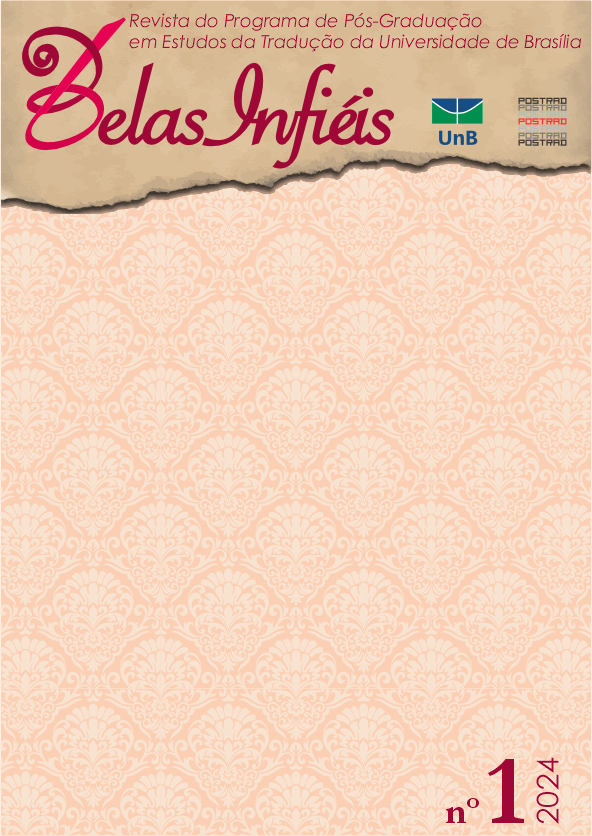Como construí uma casa: tradução da primeira publicação literária de Thomas Hardy
DOI :
https://doi.org/10.26512/belasinfieis.v13.n1.2024.49577Mots-clés :
Conto. Thomas Hardy. Tradução. Literatura Inglesa. Sátira.Résumé
Thomas Hardy foi um prolífico escritor inglês que viveu entre 1840 e 1928 — autor de romances, contos, poemas e uma peça. Trabalhando com arquitetos no início da vida adulta, enquanto se aventurava em composições literárias, sua primeira publicação foi o conto How I Built Myself a House, divulgado pelo periódico Chamber’s Journal em março de 1865, quando o autor tinha 24 anos. Apesar de a consolidação da carreira lhe ocorrer já aos mais de 50 anos, com romances trágicos que incitavam reflexões sobre a humanidade, a religião, a ciência, o matrimônio e a sociedade que lhe garantiam um certo desagrado pela crítica literária da época, esta primeira composição literária de Hardy apresenta um bom humor que antecede esse teor dramático de seus futuros trabalhos. O texto aborda as desventuras enfrentadas por um casal que pretende deixar para trás um lar nada prático e se mudar para a casa de seus sonhos. O protagonista e sua esposa, então, veem-se na necessidade de renunciar a muitas de suas idealizações durante a obra da nova residência, que também lhes gera problemas. Esta tradução brasileira de How I Built Myself a House é a primeira tradução da narrativa para a língua portuguesa.
Références
Britannica, T. Editors of Encyclopaedia. (1998, July 20). literary sketch. In Encyclopedia Britannica. https://www.britannica.com/art/literary-sketch. Acesso em: 07 jul. 2023.
Chapman, R. (1990). The Language of Thomas Hardy. Macmillan Education.
Hardy, T. (2013). How I Built Myself a House. In The Short Stories of Thomas Hardy: e-book edition. Jazzybee Verlag.
Hardy, T. (1891). Tess of the D’Urbervilles. James R. Osgood, McIlvaine & Co.
Millgate, M. (2006). Thomas Hardy: a biography revisited. Oxford University Press.
Morgan, R. (2007). Student Companion to Thomas Hardy. Greenwood Press.
Téléchargements
Publié
Numéro
Rubrique
Licence
© CC BY 2024

Cette œuvre est sous licence Creative Commons Attribution 4.0 International.
Copyright Statement
Given the public access to this journal, the texts are free to use but requires the recognition of the original authorship and initial publication in this journal to be properly stated.
The journal allows the use of works published for non-commercial purposes, including the right to submit the work to publicly accessible databases. Published contributions are the sole and exclusive responsibility of the author(s).
- When submitting papers to be evaluated by the Belas Infiéis journal, the author(s):
- Declare that the contents of the contributions are original and of their original creation, being entirely responsible for their content if there is an objection by third parties.
- Claim to be aware that they should not commit academic plagiarism.
- Declare that the manuscript has not been published, completely or partially, in Portuguese or another language. If it is a translation it should be submitted to the Translated Articles section.
- Declare that the manuscript is not being evaluated by other journals.
- Declare that the manuscript was not submitted to another journal simultaneously.
- Commit(s) to inform the journal of any kind of error or inaccuracy in their contribution (published, in evaluation or in editing) and to collaborate with the editors to make due corrections of the article (when in evaluation or editing) or erratum/retraction (after publication).
- Declare that there is no conflict of interest regarding the published work.
- Authorize its release if it is accepted for publication without any kind of monetary compensation.
- Agree to assign non-exclusive rights to publication to the magazine, remaining free to make their contribution available in other media as long as the publication of the first version in Belas Infiéis magazine is mentioned. They also authorize Belas Infiéis to assign their texts for reproduction in content indexers, virtual libraries and similar platforms.
- Maintain copyright and grant the journal the right of first publication, the work being licensed under theCreative Commons Attribution License.
- Is/Are allowed and encouraged to publish and distribute their work online after the editorial process, which may increase the impact and citation of the published work.
- Authorize the editorial team to make textual adjustments and to adapt the article to the publication rules, when necessary.



















